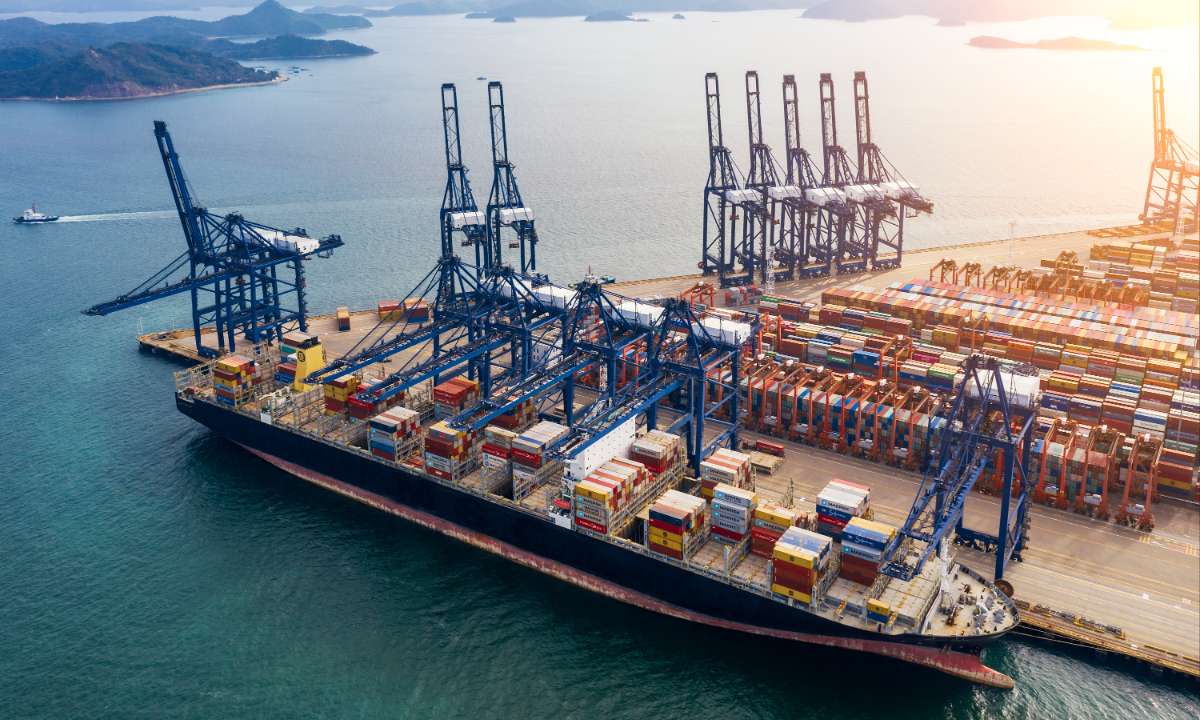China’s economy shows resilience in face of global troubles, nation still leads recovery
Nation's trade continues to lead world recovery

Yantian Port in Shenzhen, South China's Guangdong Province Photo: VCG
In a complex global environment marked by profound disruptions to global trade and trade protectionism, many countries, including Western developed countries, have seen serious economic troubles, with Germany, known as the "European economic locomotive," for example, has been dragged into a trade deficit for the first time in 30 years.
In comparison, China's trade surplus in May was $78.76 billion, with a trade surplus near $300 billion in the first five months of this year. Analysts said the contrast not only reflects China's economic resilience, but also shows the "complete failure" of the US' attempt to disrupt the global trade system.
French Customs said that the trade deficit for French goods reached a new record in May, at 13.1 billion euros ($13.34 billion), due to the deterioration of the country's energy balance.
Japan ran its biggest single-month trade deficit in more than eight years in May as high commodity prices and a declining yen swelled imports, clouding the country's economic outlook, according to Reuters.
The growing trade deficit underscores the headwinds the world's third-largest economy faces from a slide in the yen and surging costs of fuel and raw materials, on which domestic manufacturers rely for production, Reuters said.
Germany, Europe's biggest economy, reported its first monthly trade deficit in three decades, as its shortfall in May was 1 billion euros, a gap not seen since 1991.
Experts cited mixed reasons behind the widening trade deficit in many economies, including the Ukraine crisis which added woes to an already battered global supply chain, as well as the economic trauma in many developed economies in recent years.
Many countries apart from China have taken a severe blow in their supply and industrial chains and have not entirely recovered from these blows, Bai Ming, deputy director of the international market research institute at the Chinese Academy of International Trade and Economic Cooperation,told the Global Times, adding that this caused many countries to encounter difficulties in producing or shipping their products abroad, which eats into their share of exports.
In particular, observers stressed that the Ukraine crisis has played a part in accelerating the trade deficit. For countries like Germany or other EU countries who depend a lot of Russian bulk commodities, the Ukraine crisis, which led to a decrease in energy trade between Moscow
and many European countries, the cost of bulk commodity imports has risen considerably.
Mei Xinyu, a research fellow at the Chinese Academy of International Trade and Economic Cooperation of China's Ministry of Commerce, also told the Global Times that western sanctions toward Russia on the Ukraine crisis would "backfire" on the EU by causing its exports channels to be restricted, while increasing the costs of its raw materials and logistics, further slashing the competence of its industries.
"After the Ukraine conflict, many of the EU's traditional competitive industries like cars and chemicals will likely fall in global markets," said Mei.
However, looking deeper into the trade deficit phenomenon, observers said that they reflected more intrinsic economic problems faced by those countries. For instance, Chen Jia, a research fellow at the International Monetary Institute of the Renmin University of China, told the Global Times on Sunday that Japan's trade fluctuation could be seen as a symptom of the countries' economic weakening in a post-pandemic environment, with problems like high inflation, currency depreciation and so forth.
Likewise, the EU's dependence on cheap fossil energy in the past decades have not only caused its economy to recede under global volatility, but has prompted it to lag largely behind China and the US in pushing new tech reforms, like the application of new energy, Chen said.
China's trade grew 11.1 percent year-on-year in May, posting a trade surplus of $78.76 billion, expanding 82.3 percent year-on-year, despite of mounting headwinds of rising international commodity prices and declining overseas demand amid high inflation.
According to experts, the contrast between China and many US' allies' trade situation not only reflects China's superiority in terms of economic resilience, but also shows the "complete failure" of the US' strategy to reform global trade system, especially with a focus on cracking down upon China to support other regions.
"China's role as trade powerhouse and global factory is being strengthened, while many of its competitors are heavily impacted by a turbulent global landscape, with some showing signs of economic recession," Chen said.
But Bai cautioned that the economic weakness of European countries might add pressure to China's trade as well, as European and the US customers are major purchasers of Chinese goods.
"China's trade pressure has gradually eased in the first half of this year, and performance in the second half hinges on factors like competition from Southeast Asian economies and the demands from European or US markets," Bai said, but adding that if coronavirus situation is under control, then a stable trade situation still can be expected.
Mei also noted the widening trade deficit in overseas countries would strengthen China's role as the world's factory. But if China's exports prices surges too much, it will also give opportunities to other countries to catch up with China's export advantages.

